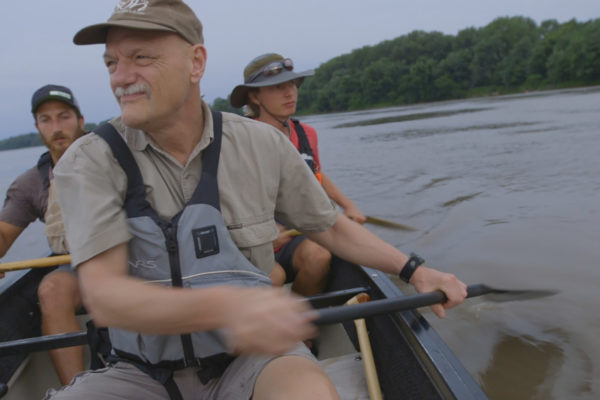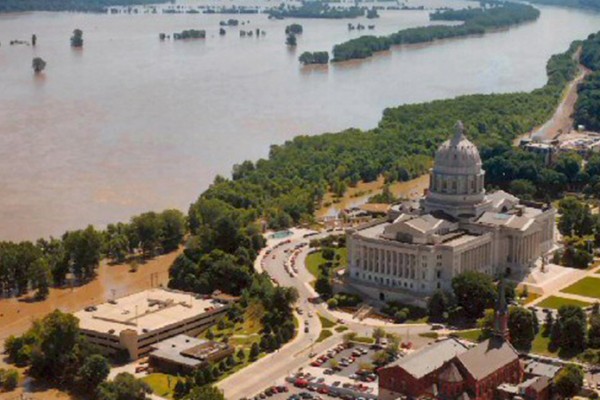Washington People: Bob Criss
During an 8-mile journey from the Columbia Bottom conservation area over the Chain of Rocks in a canoe, Bob Criss in Arts & Sciences talks about Lewis and Clark, navigation and the relevance of rivers today.
Major Midwest flood risk underestimated by as much as 5 feet, study finds
As floodwaters surge along major rivers in the midwestern United States, a new study from Washington University in St. Louis suggests federal agencies are underestimating historic 100-year flood levels on these rivers by as much as five feet, a miscalculation that has serious implications for future flood risks, flood insurance, and business development in an expanding floodplain.
Humans have been changing Chinese environment for 3,000 years
A widespread pattern of human-caused environmental degradation and related flood-mitigation efforts began changing the natural flow of China’s Yellow River nearly 3,000 years ago, setting the stage for massive floods that toppled the Western Han Dynasty, suggests new research from Washington University in St. Louis.
Flooding will only worsen unless river management improves, says WUSTL hydrogeologist
Washington University in St. Louis hydrogeologist Robert Criss, PhD, wasn’t particularly surprised by the spring floods on the Mississippi this year. Floods are becoming more frequent and more severe, he says. “We are increasingly constraining the river by building wing dikes and higher levees and then upping the ante by building in the river’s natural flood plains” Criss says. “There are far better ways to deal with this problem than have municipalities compete with one another to build the highest levee and fight over who has the right to be protected in times of distress.”
Lower Midwest braces for flood onslaught
Residents of the central and southern Midwest are crossing their fingers, saying their prayers, planning evacuations, and in some cases filling sandbags in preparation for the excessive water
Image courtesy of NOAAWUSTL geologist Robert Criss warns of “serious water” that could give some areas their second worst flood on record. ravishing communities in Iowa and Wisconsin. “The flood wave is propagating down the Mississippi River towards St. Louis at about the pace of a brisk walk,” said Robert E. Criss, Ph.D., professor of earth and planetary sciences in Arts & Sciences at Washington University in St. Louis. “Some areas north of St. Louis in Missouri and southern Iowa are bracing for the second worst flood in their history. This is serious water.”
Lessons not learned from 1993 flood, geologist says
Patterns in the Midwest this spring are eerily reminiscent of 1993 and 1994, back-to-back years of serious flooding. But Midwesterners have not learned “geologic reality,” says Robert E. Criss, Ph.D., professor of earth and planetary sciences in Arts & Sciences.
Geologist decries floodplain development
Photo courtesy of USGSLevees are not infalliable.Midwesterners have to be wondering: Will April be the cruelest month? Patterns in the Midwest this spring are eerily reminiscent of 1993 and 1994, back-to-back years of serious flooding. Parallels this year include abnormally high levels of precipitation in late winter and early spring, early flooding in various regions, and record amounts of snow in states upstream. One thing Midwesterners have not learned is “geologic reality,” says Robert E. Criss, Ph.D., professor of earth and planetary sciences in Arts & Sciences at Washington University in St. Louis.
New Orleans-style disaster could happen again in California
Courtesy photo*Delta Primer*Is California vulnerable to a New Orleans-style levee break? The land in the Sacramento-San Joaquin Delta, where California’s two great rivers drain into San Francisco Bay, lies as much as 20 feet below sea level, warns Jane Wolff, author of Delta Primer: A Field Guide to the California Delta (2003). A breach on the scale of that in New Orleans would prove catastrophic for California — the world’s sixth-largest economy, home to approximately 10 percent of the U.S. population. In addition to property destruction, salt water from San Francisco Bay would migrate upstream, contaminating the water supply for much of Southern California, including major cities such as Los Angeles and San Diego.
Nation on the verge of ‘new era in modern river management’
Lowry explores the dynamics behind efforts to restore rivers.As America celebrates the bicentennial of Lewis & Clark’s epic journey up the untamed Missouri River, the nation finds itself on the verge of a new era in modern river management, one in which proponents of environmental protection and ecosystem restoration stand on equal footing with those of the hydropower, barge and boating industries. In a new book, Dam Politics: Restoring American Rivers (Georgetown University Press, 2003), noted environmental politics expert William R. Lowry explores the dynamics behind recent efforts to restore American river systems to a more pristine state. The politics of river restoration run deep, and it is politics, argues Lowry, that will ultimately dictate the success or failure of future efforts to restore and preserve the nation’s riverways.


